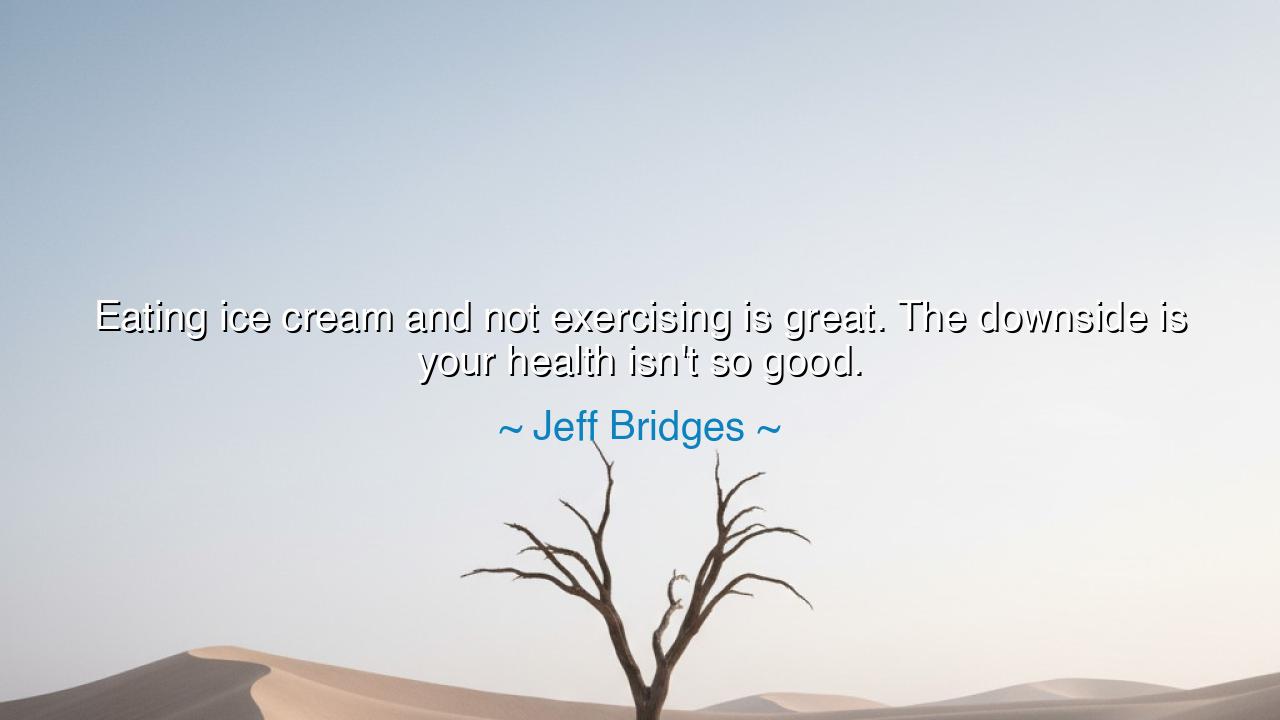
Eating ice cream and not exercising is great. The downside is
Eating ice cream and not exercising is great. The downside is your health isn't so good.






The wise and humble actor Jeff Bridges, a man known not only for his artistry but for his calm wisdom, once spoke words both lighthearted and profound: “Eating ice cream and not exercising is great. The downside is your health isn’t so good.” At first, his statement seems simple—almost playful. Yet beneath the humor lies a truth as ancient as human nature itself: the eternal struggle between pleasure and discipline, between the sweetness of the moment and the strength of the future. His words, wrapped in jest, are a reflection of the oldest lesson—that joy without balance becomes decay, and indulgence without restraint leads to sorrow.
In the ancient days, the philosophers of Greece spoke often of the Golden Mean, the sacred balance between excess and deprivation. Aristotle taught that virtue lies not in denying pleasure, but in mastering it—that one may taste life’s delights, yet not be ruled by them. Jeff Bridges, in his modern tongue, echoes this wisdom. The ice cream he speaks of is not merely food, but a symbol of all things pleasurable and easy: comfort, indulgence, idleness, and escape. And exercise is not merely movement of the body, but the practice of effort, the discipline of mind and spirit that preserves vitality. Together, his words remind us that joy is sweetest when it is earned, and that comfort without care leads to ruin.
The ancients told of Odysseus, who, in his long voyage home, encountered the Lotus-Eaters—a people who lived in blissful forgetfulness, feasting upon flowers that dulled their memories and their will. They felt no pain, but also no purpose. In them we see the danger of too much pleasure, the same warning that hides beneath Bridges’ humor. To eat the lotus—or the ice cream—and to neglect the labor that sustains life is to surrender one’s power. For comfort is a gentle captor: it lulls the spirit, weakens the body, and steals the hunger that drives us to grow.
Yet Jeff Bridges does not condemn pleasure. He smiles as he speaks, and so must we. There is no sin in delight, no crime in sweetness. The problem lies not in the ice cream, but in forgetting the price it demands. Health, whether of body, mind, or soul, is not granted freely—it is cultivated through action. Exercise, in its truest form, is the ritual of respect we pay to life. Each movement is a conversation with our mortality, a reminder that our bodies are vessels meant to be used, not neglected. In this way, the quote becomes a parable of responsibility: enjoy the gifts of the world, but repay them with gratitude and effort.
Even the great emperors of Rome, surrounded by endless luxury, feared the poison of excess. Marcus Aurelius, philosopher and ruler, warned that indulgence weakens the will and clouds the mind. He practiced moderation even as gold and feast surrounded him, for he knew that the ruler who cannot master himself cannot master an empire. In his restraint, he found freedom. Likewise, the person who learns to balance delight with discipline becomes the ruler of their own life. For as Bridges reminds us, the sweetness of pleasure fades quickly, but the strength of health endures.
So let the lesson be clear: pleasure is a gift, but health is a covenant. To live well is not to deny joy, but to guard it. Eat your ice cream, but walk afterward. Rest, but rise again with purpose. Laughter and effort, indulgence and restraint—these must dance together if the spirit is to remain whole. For every pleasure the body enjoys must be balanced by a deed that honors the life that makes it possible.
Therefore, my friends, live as the wise do—grateful for pleasure, but never its prisoner. Remember that discipline is not the enemy of joy, but its protector. The body that moves with strength carries the heart that can laugh without guilt. And so, in the gentle humor of Jeff Bridges, we find a teaching both simple and eternal: that a sweet life is not made by sweetness alone, but by the harmony between pleasure and purpose. When you learn this balance, you will find not only good health, but good living—and your joy, like your strength, will endure.






AAdministratorAdministrator
Welcome, honored guests. Please leave a comment, we will respond soon